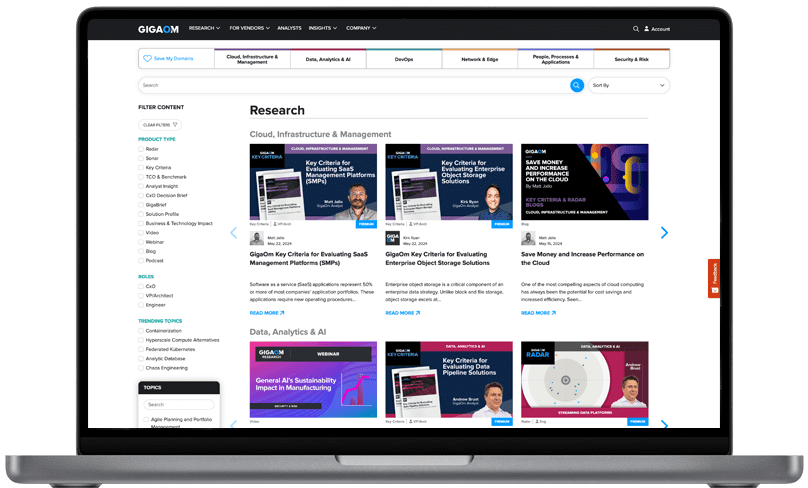Table of Contents
- Summary
- Market Categories and Deployment Types
- Key Criteria Comparison
- GigaOm Radar
- Vendor Insights
- Analyst’s Take
- Methodology
- About GigaOm
- Copyright
1. Summary
In the GigaOm report “ Key Criteria for Evaluating GitOps Solutions,” we defined GitOps as “an approach to supporting continuous delivery that aims to simplify, accelerate, and improve the way organizations apply application code and infrastructure changes to deployment environments.” The report discusses technical aspects, value proposition, and adoption approaches associated with GitOps. We summarize each of these below.
Key technical aspects of GitOps are the use of source code repositories as the “source of truth” for application and infrastructure state and automated mechanisms to apply and maintain the state with target infrastructure environments. This approach requires that infrastructure is described as code and stored alongside application code. Following this approach allows both infrastructure and application code to be managed consistently and proceed through a unified deployment pipeline.
GitOps offers several potential benefits to an organization, and we can summarize the elements of the GitOps value proposition as:
- Simplification and rationalization of tools across developer and operations staff.
- Enabling collaborative, code-centric workflows.
- Improved traceability and auditability of application and infrastructure changes.
- Increased agility alongside enhanced reliability.
- Potential for improved security through more codified processes and reduced attack surfaces.
As an approach rather than a specific technology, organizations may take different paths to realize the benefits of GitOps, and the set of solutions they may consider and ultimately adopt to support them will depend on a variety of factors. Factors to consider are current and planned technical state as well as procedural and cultural alignment. Broadly speaking, organizations who have adopted cloud-native technology and have adopted DevOps will have a relatively shorter path than those for whom neither is true.
In addition to a deeper discussion of the topics above, “Key Criteria for Evaluating GitOps Solutions” established an evaluation framework for assessing GitOps-related solutions. This report applies that framework to a set of six representative products in the marketplace and describes functional characteristics and differentiators of each. In addition, we provide a visual representation of products’ current positioning and expected future direction in the Radar diagram. Finally, we provide overall market observations and guidance for organizations considering GitOps adoption.
How to Read this Report
This GigaOm report is one of a series of documents that helps IT organizations assess competing solutions in the context of well-defined features and criteria. For a fuller understanding, consider reviewing the following reports:
Key Criteria report: A detailed market sector analysis that assesses the impact that key product features and criteria have on top-line solution characteristics—such as scalability, performance, and TCO—that drive purchase decisions.
GigaOm Radar report: A forward-looking analysis that plots the relative value and progression of vendor solutions along multiple axes based on strategy and execution. The Radar report includes a breakdown of each vendor’s offering in the sector.
Solution Profile: An in-depth vendor analysis that builds on the framework developed in the Key Criteria and Radar reports to assess a company’s engagement within a technology sector. This analysis includes forward-looking guidance around both strategy and product.
